Now almost three months since Middleground facilitated a leadership workshop in Pretoria with VSO, we are checking what happened next, and whether, in fact, this had been a good investment. This blog is for people in VSO who are wondering why this Leadership Workshop was such a big deal, and also for those in the wider Middleground community, who are interested in how others are developing leadership in their organisations.
________________________
Why would a well-respected and successful organisation gather 43 busy people from around the globe to spend three days together? Was it a crisis? Or a costly and indulgent group hug? Middleground held in-depth interviews to find out more.
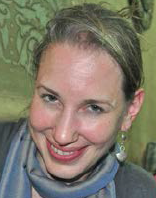 “What brought me to VSO is a vision of doing development differently, thinking outside the box, bringing people together so that sparks will happen!” This is what drives Steph Sluka Brauer, an American who joined VSO over three years ago as Head of Funding – Africa, based in South Africa.
“What brought me to VSO is a vision of doing development differently, thinking outside the box, bringing people together so that sparks will happen!” This is what drives Steph Sluka Brauer, an American who joined VSO over three years ago as Head of Funding – Africa, based in South Africa.
But an inertia arising from 50 years of success, can sometimes threaten Steph’s sense of pregnant possibility for VSO. Steph continued: “We all came to the workshop representing a subset of VSO, with our own assumptions, and those expecting a new organisation chart and a full set of costed plans to comment on, were to be disappointed!”
So what was the workshop for? “A new CEO and Executive Board were expressing an idea, and a lot of the ingredients were already there, but VSO needed that catalytic moment to send the signal that things will change, then hundreds of actions can come from everyone to manifest that change.”
We learned more about the new CEO from our second interviewee, Papa Diouf, who has just joined VSO as Country Director in Rwanda. “There is always a temptation to think that a leader has all the solutions, and to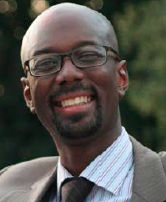 expect immediate decisions and miracles. But having literally just arrived, our new CEO faced a plethora of issues. He can’t just stop everything to tackle the issues; somehow we had to come together while still driving along. He did this quite well.”
expect immediate decisions and miracles. But having literally just arrived, our new CEO faced a plethora of issues. He can’t just stop everything to tackle the issues; somehow we had to come together while still driving along. He did this quite well.”
This showed us Philip Goodwin, VSO’s new CEO, had been sidestepping some treacherous CEO traps. He even surprised the Middleground facilitators, Karima Grant and Tony Page, when we asked them not to try to deliver a particular outcome! Instead we should draw from 50 years of VSO knowhow in volunteering, and try to build a “truly shared understanding of what we know and what we don’t know”. By all being clear about where we are, we would strengthen their combined impact towards the ultimate purpose of fighting poverty.
So what actually happened?
For Papa Diouf: “When I arrived in the room I did not know what to expect. It was great to hear the perspective of the 43 leaders across the globe. We needed, almost like an alcoholic, to admit our problems to be able to move forward. And we were motivated to change things, but we were also scared. We knew we needed to walk together, but no one knew for certain where we were heading…”
When everyone put on their hats as “leaders for VSO”, they became a linked “system” of inter-dependent people, thinking as one rather than just fighting for their own functions. This made it possible to identify VSO’s biggest challenges or “opportunities”: the sector is now highly competitive, new Sustainable Development Goals demand a refocus of the work, a long-standing relationship to DfID (the largest funder) is shifting, a stronger identity for VSO is needed, old networks and new partnerships must be developed, programmes can be made more robust.
These “challenges” were in reality “dilemmas” requiring a tricky choice, often between equally unattractive alternatives.
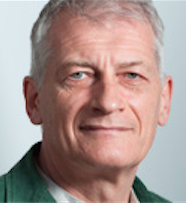 Two weeks ago, to find out whether or not such dilemmas are unique to VSO, we spoke to Burkhard Gnarig, Executive Director of International Civil Society Centre. Burkhard, who works with the CEOs of 25 international NGOs, confirmed they all face a similar, disruptive shift. Hindered by “charitable and colonial baggage” they need to ask deeply provocative questions such as: Why do funders need your costly organisation when they can reach someone in Tanzania directly? Can you shift to be more like partners than parents? What kind of identity do you want to have? Can you see yourself as part of a larger movement?
Two weeks ago, to find out whether or not such dilemmas are unique to VSO, we spoke to Burkhard Gnarig, Executive Director of International Civil Society Centre. Burkhard, who works with the CEOs of 25 international NGOs, confirmed they all face a similar, disruptive shift. Hindered by “charitable and colonial baggage” they need to ask deeply provocative questions such as: Why do funders need your costly organisation when they can reach someone in Tanzania directly? Can you shift to be more like partners than parents? What kind of identity do you want to have? Can you see yourself as part of a larger movement?
Steph also sees the need to differentiate and collaborate: “Instead of just doing lots of lovely things that are indistinguishable from other NGOs, we need to have a USP that gives us a mandate. When we understand our offering, competitors can become allies! Then we don’t squabble about which organisation is best placed to do something, or how the budget is shared – our focus moves to forging the right kind of partnerships towards the impacts we’re seeking.”
So where did the three days of workshop take us?
Says Papa: “I am usually cynical about workshops, but you kept us focusing on the future not getting bogged down. People were committed to addressing the six core challenges facing the organisation. The energy was quite high!”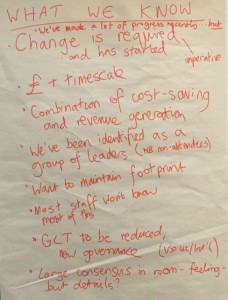
Steph: “In a way, this was pushing people beyond the immediate questions of will I still have a job and a pay-check, and even will I need to move home? By the third day, from new and wider vantage point we said OK we understand what’s expected of us as leaders, and what opportunities are opening up. So now we can spread it virally and quickly from within our respective spheres of influence.”
Towards the end, colleagues had the energy and readiness to move forwards, but asked what needs to happen next.
For Papa: “This workshop made me realise I am not the only leader. Everyone is a leader, wherever you are: you can empower yourself to make positive changes. Embrace that, and then you can also empower others, with mutual accountability!”
Papa, on arriving in Rwanda, found that recent staff departures had weakened their capacity. He wanted to draw from the example of Philip at Pretoria, so he gathered every single staff member. Starting with “This is where I feel we are”, they held discussions to agree on the challenges, then he asked: “Since we are here, what do we need to do?”
Creating this break from daily busy-ness local staff and volunteers became more a part of VSO, with greater clarity about how the future looked, and more accountable to one another. Like Papa, 43 leaders now want to bring the wider staff of VSO with them, and to do so in the new way.
Why new?
Lynda Gratton, Professor at London Business School shows us how traditional assumptions about leadership are being overturned: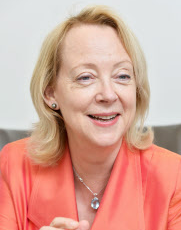
- Regarding leaders: We have always thought leaders stand at the front and everyone follows them, but actually, if everyone is connected, why does somebody need to stand at the front?
- Regarding individual employees: How do they get their voice heard, when they are surrounded by (hundreds of) others, to become part of the change themselves?
The new approach is to “distribute” the leadership, and this means the 43 leaders are inviting everyone in VSO to play a part that is different than what they might have expected. They aim for the 800 or so people in 30 country offices in UK, Africa, Asia and the Pacific, each to gain a shared sense of being leaders, playing their full part in an ambitious new change agenda towards fighting poverty.
Steph, and her team spread across the organisation, can see where this is heading: “If you came back in six months you should find more coherence between people, faster decisions better aligned with our values, and much greater responsiveness. An increase in certain types of partnership, away from a popcorn approach makes us bolder and more strategic in pursuit of the right types of funding.”
“Already cross-functional groups are addressing the six core challenges, and this is informing each function, like a secret life behind the scenes. After a call this morning I know that 80% of our commitments for the next nine months are underway! We can see a shifting of the organisation, with different conversations happening during business as usual. Tasks have a different timbre to them. We are saying, if we want to be more Programme driven we should be doing this and this.”
What are the concerns, and the risks?
“This should be self-perpetuating but when you get to the unsexy day to day…” that’s the tough part! Right now a restructuring is taking energy and clouding priorities, so many want to complete it faster.
There are communication shortfalls and, also a risk that, instead of “distributing leadership”, nothing will have changed, that is, until a really honest relationship of true accountability is forged between Head Office, Regions and Countries.
To close, was this a crisis, or a jolly?
Neither. This is 43 people doing the work of leadership. They took the time needed to clarify what they know and do not know, and to start to change their behaviour, so that everyone else can join the change agenda as co-leaders towards greater impact.
Good work so far. Let’s keep it moving! 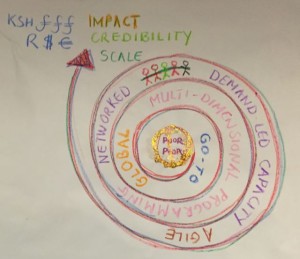
________________________
Posted 23 July 2015 Middleground would like to thank Papa, Steph, Burkhard, Philip, Kathryn Gordon and Jacky King (re VSO’s work with Lynda Gratton).
Videos for reference: Lynda Gratton on 3 mindshifts, Burkhard Gnarig/ICSC on Riding The Wave